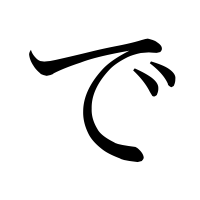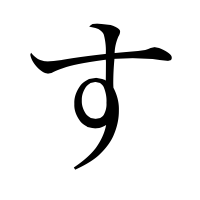--I'm going to be teaching as if the reader knows nothing about the Japanese language except Hiragana and Katakana.--
Hello everyone! :D I'm moonlit dream, but you can call me Akioh! Today I'm going to talk about a Japanese word that comes up a lot among otaku:
That's right, it's DESU! Most otaku are familiar with the word, as in they've heard the word before. In English otaku-speak, "desu" is often added onto the end of sentences to be cute, or in mock-cuteness. The usage of the word may have been popularized by Suiseiseki's frequent usage of "desu" in the Rozen Maiden anime.
Now it's time to learn the truth about "desu". Before I talk about the purpose of です in the Japanese language, let me clear up some misunderstandings that are commonly associated with です:
- です is not used to make your speech sound cuter.
- です cannot be classified in any part of speech used in English. (noun, verb, adj, etc...)
- です is used in polite speech.
- です is more accurately pronounced as "dess" rather than "dess-oo".
So what exactly is です?
Literally, です means "present/future tense."
In Japanese sentence structure, there are 4 types of tenses: present/future (ex: is, will); present negative/future negative (ex: isn't, won't); past (was); and past negative (wasn't).
The tense of a sentence in Japanese is determined at the very end of a sentence. For sentences ending in nouns or certain adjectives called な adjectives, a tense-giving word called a copula is placed after the noun or な adjective to give the sentence its tense.
です is the present/future tense copula. (We'll talk about the other 3 copulas another time.) It is commonly translated as "is" or "will." Whether or not you are talking about the present or future is a matter of context. The default is normally present. Therefore, If です comes after a noun/な adjective, then that sentence is talking in the present tense. (NOTE: This does not apply for sentences with です after an い adjectives. But we'll talk about です in that situation another time.)
Confused? xD It's okay. What makes です confusing is that there isn't a direct translation to it in English because of the grammar differences between Japanese and English. But don't worry, using です is much easier than you think. :) It makes much more sense in sentences. Which brings us to...
Todays Sentence Structure
___ は ___ です. (___ wa ___ desu.)
Translation: ___ is ___.
Blank 1 is a noun. Blank 2 is a noun or a な adjective. Paticle は comes after the subject of the sentence.
Example Sentences:
- わたし は アキオ です. (watashi wa akio desu.) I am Akioh. [[Note: do not use honorifics when referring to yourself.]]
- きょう は きんょうび です. (kyou wa kinyoubi desu.) Today is Friday.
- えみちゃん は しずか です. (emi-chan wa shizuka desu.) Emi-chan is quiet.
And lastly, I'm going to end all of my posts with a kanji. :D Today's kanji is really easy:

Pronounced: いち ICHI.
Meaning: ONE.
It is the easiest kanji in the Japanese language. xD
Thank you for reading, and I hope you learned something! Please put questions/etc in the comment box if I was unclear at any time. :) Good luck learning!

